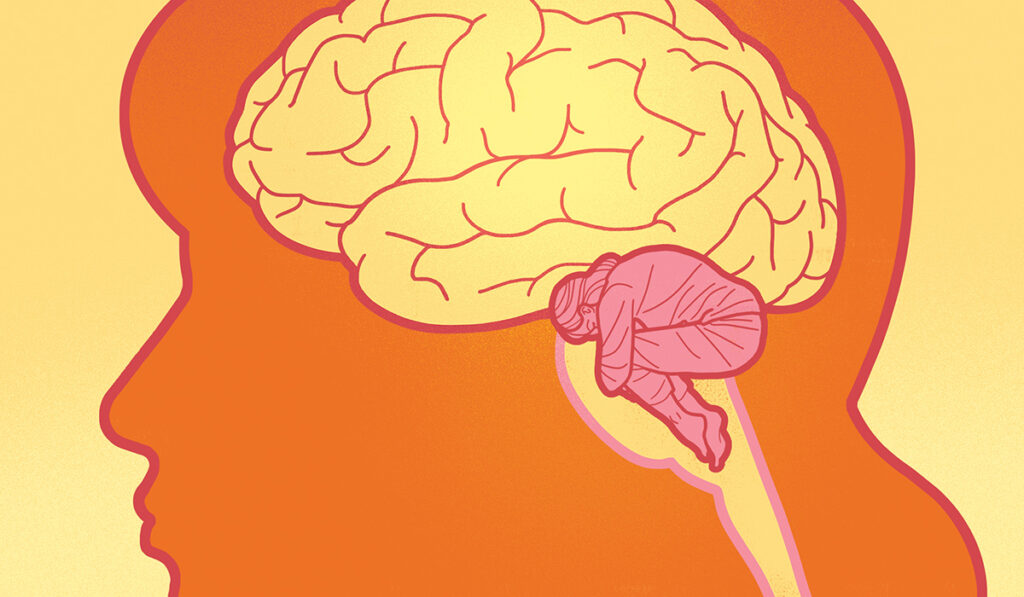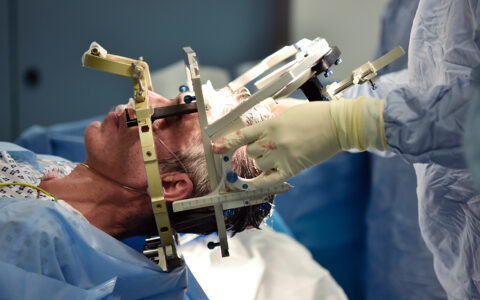Psychosis is one of the most common manifestations of a heterogenous psychiatric disorder spectrum commonly characterized by delusions, hallucinations, and disorganized behavior.
As a treatment-resistant psychiatric disorder, hospitals or justice settings are often the sites for interventions.
Meanwhile, progress is being made through research to understand the neural networks underlying these abnormalities through research focused on the brain structures and behavioral or psychological processes.
Psychologist Alexandra Moussa-Tooks, Ph.D., of Vanderbilt University Medical Center, is exploring the nature of associations with the cerebellum, other neurological sites, and the types of patients in whom these connections are strongest.
“For the most part, when people think of the cerebellum, they think of motor symptoms, but we are learning about the role it plays in our cognitive and behavioral patterns.”
“For the most part, when people think of the cerebellum, they think of motor symptoms,” Moussa-Tooks said. “But we are learning about the role it plays in our cognitive and behavioral patterns, as well.
“This isn’t surprising, considering the fact that the cerebellum, which is highly folded and dense, contains about 50- to 80-percent of our neurons and organizes the modeling and remodeling of how we view the world.”
Beyond Motor Function
Evidence of the connection between psychosis and the cerebellum is found as motor symptoms – considered the cerebellum’s predominant sphere of control – regularly occur in advance of the mental illness. Subtle symptoms may be observed in childhood and across the development trajectory before the appearance of more widespread deficits that ultimately manifest as psychosis.
“The cerebellum doesn’t function in a vacuum,” Moussa-Tooks said. “It not only coordinates motor processes, but it also helps coordinate higher-order processes. It works through loops of communication with other brain areas to say: ‘I have this model of the world. This is what I expect would happen. Is this what happened?’ If not, it updates the model.”
There also is evidence that different regions of the cerebellum contribute to different brain functions. Cognitive functions tend to be associated with the posterior region, but more specific locations and roles have not been fully elucidated.
Brain circuit connectivity is central to these relationships, she said.
“We know the cerebellum helps with processes like social cognition and memory and has connections with the frontal parietal network,” Moussa-Tooks said.
“We wanted to see if we could localize the deficits in people with psychotic disorders. We want to know if we are just seeing a broad cerebellar deficit, or whether the deficits are more circumscribed within the cerebellum.’”
Developmental Deficits Stand Out
To answer this, she and her colleagues studied structural MRIs of 574 individuals, which included people with schizophrenia, schizoaffective disorder, schizophreniform disorder, and bipolar disorder with psychotic features. Study results were recently published in Biological Psychiatry.
When looking at the psychosis cohort as a whole, researchers found no significant imaging differences when compared to healthy participants. The same held true when they stratified the study group by diagnoses. When they looked at stage of illness, again they found no associations.
“Patients who were cognitively compromised prior to their onset of psychosis had smaller cerebellums and significant cerebellar deficits.”
They then classified the patients into three buckets by cognitive ability: normal premorbid ability and normal current ability; normal premorbid ability but impaired current ability; and poor premorbid and poor current ability.
“This last group of patients who were cognitively compromised prior to their onset of psychosis had smaller cerebellums and significant cerebellar deficits. This was in both motor and cognitive areas, but really robust in the cognitive area,” Moussa-Tooks said.
“These early deficits in cognitive ability suggest there are early experiences that contributed to poor neural development in this group. This offered an important profile of an underdeveloped or deteriorating cerebellum that likely contributes to certain symptoms within psychotic disorders.”
Addressing Insults
Moussa-Tooks said there is strong evidence that environmental stresses or insults to the brain –traumatic injury, oxygen deprivation or childhood traumas – may prevent the cerebellum from developing fully. Knock-on effects can manifest as underdevelopment in the thalamus, prefrontal cortex, and other brain regions.
People who experience psychosis as young adults may exhibit abnormal behavior and poor school performance as children. She and her colleagues are planning to use the Adolescent Brain and Cognitive Development dataset to tease apart the damage, when it occurred, and the impact on certain areas of the cerebellum. They will also look at the behavioral or symptom profiles that arise from these interactions.
“While there are different developmental windows for different areas, the cerebellum continues to develop and refine – up until age 30 or 40, according to some estimates. This leaves room for intervention into early adulthood.”.
Moussa-Tooks aims to target risk factors for abnormal development that may contribute to the emergence of psychosis.
“Coupled with my other lines of research, I hope this work will elucidate the mechanistic role of the cerebellum in psychotic disorders, leading to improved treatment,” she said.





